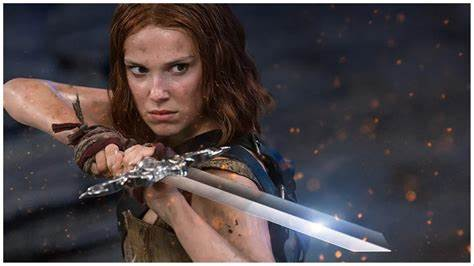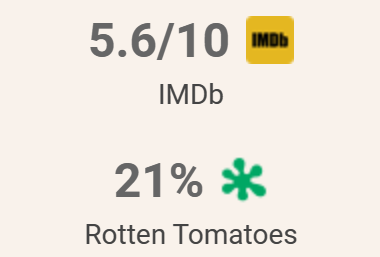Written with the caveat that I obviously know nothing about storytelling, and am a complete hack, and if I ever drunkenly forward you anything I’ve written, please for the love of god don’t read it.
I’ve just started watching Rebel Moon. And by “just started”, I mean I’m something like 90 seconds into it. It has reminded me that I absolutely hate opening narration in movies. Hate it. Because I think it’s a trope that has proven, time and time again, that movie producers think they’re super-smart galaxy-brained artistes, and that their audience is stupid.
Sure, people tend to have the metacognitive capacity of a yeast infection, but they’re more than capable of figuring out that the tall guy, all in black, wearing a mask, and accompanied by ominous music, who has just commanded a bunch of masked troopers to murder a bunch of scared, unmasked, guys on the smaller spaceship that they’ve mercilessly chased down, is going to be the villain. That requires zero dialogue or on-screen text to explain. It doesn’t need to be that overt, but most audiences would rather be confused (but intrigued) by something for a few minutes than bored for a few seconds while someone reads out the plot or it’s flashed up on screen for us — an awkward moment that is always either too short to take it in, or so long we have to go over it twice.
Opening narration, therefore, can be avoided with some easy — even trivial — filmmaking approaches.
Unless you’ve miraculously avoided it in the last several decades, you probably recognised the above reference as Star Wars — it’s almost a cliché how much it’s the go-to example for overtly establishing who is Good and who is Bad with little dialogue. This is a little ironic because, often, a cliché defence of opening narration will be something like Star Wars. After all, Star Wars has its famous opening crawl: it flies by, in big yellow text, and explains the plot to you. You can’t miss it. The film that I said showcases why you don’t need opening on-screen narration (that I hate so much) happens to be one of the most memorable and famous examples!
But, if you ever pay attention to the text of those crawls, they’re surprisingly uninformative. As prose, they’re often very, very hokey. Possibly even intentionally so. I would doubt that most people can remember much of the text from any of the movies — that might be something for hardcore fans of the “we need to add ‘braces’ to Wookieepedia because an extra was seen wearing them for five frames” variety, but definitely not normal people. What do you remember, though, is the massive “STAR WARS” logo fading away, the horns of John Williams’ score, the crawling text fading into the distance… this is an audio-visual experience, it is setting a tone, a scene. You could stick Lorem Ipsum up there and lose only a few percent of the experience. And, post-1977, this has become literally iconic, so there’s that.

Because the point of any opening narration — your whole opening scene, in fact — is not to explain the plot, but to explain to the audience why they should care about the plot. It’s almost screenwriting (and general writing) 101 to say that, but surprisingly few films manage to pull it off. Honestly, the number of movies with 9-figure budgets that fail this simple requirement makes you think Hollywood must be covering up a lot of money laundering…
In Brandon Sanderson’s lectures on writing, he states quite clearly — and early on in his series — that you should open a story with a “promise”. He essentially means that you set the tone and expectations as quickly as possible, and you deliver on it. He was talking about novels, but it applies to film, where you’re even more pushed for time but can also access the audio-visual medium, equally well. Obviously, Star Wars does this very well: everything about that opening crawl promises you a bombastic adventure, deliberately modelled on old Flash Gordon serials, and it delivers. The text on its own doesn’t matter. No one cares. But the entire experience does make you sit up and take note about what is coming next.
Anyway, the second thing that sparked off this was that I also recently watched Damsel, the Millie Bobbie Brown vehicle on Netflix and… it’s surprisingly good. Remembering that my taste in tv and movies is basically toilet water, it turns out to be trash fantasy that is (unexpectedly) competently executed. It opens with a black screen and the lead character saying something to the effect of:
There are many stories where a princess is rescued. This is not one of them.
Now, it doesn’t matter what the exact words are (go look up a script if you care), the point is this: it’s there to set the tone of the movie. Normally, with this sort of garbage, you’d expect it to go on at length while she explains who she is and the camera will pan over some wordless activity and, yes, you’ll be fully caught up but… you’ll also be bored, have zero salience for any of it, and will probably just forget the details later anyway. A key thing in filmmaking is cluing your audience into what they need to stash in their long-term memory to pull out later (what is a set-up) and, generally, voice over narration at the start just sucks at that.

But Damsel doesn’t do any of that. It doesn’t go on longer than the one line. It doesn’t have her say “My name is Elodie and I live in this castle and this is the name of the world I live in“. It restrains itself to stating the theme, and then stops because the rest doesn’t matter. It tells us that this is going to be some fantasy movie, and probably involving a princess, and likely to be a bit dark and moody in places (given that it’s spoken over a black screen) and the rest of the film will probably just involve Millie Bobby Brown kicking ass and getting hurt a lot. Sorry for the spoilers, that’s basically the plot and premise: she racks up injuries faster than Joey King in The Princess.
Anyway…
I got 90 seconds into Rebel Moon, got annoyed by the narration trying to explain the plot, at least the background of the plot, without telling me why I should care about it… and sparked a thought I wanted to write down here. Now, I’ve reached the part where I’d talk about how bad the Rebel Moon opening narration is, but… in all honestly I’ve actually forgotten what it was. I think the words “assassins blade” were used. I forget why. I was mostly focused on whether it was Anthony Hopkins or someone trying to be Anthony Hopkins, the actual content was quite unenlightening.
That said, if the reviews the vibes I get online are correct, I feel that — in Brandon Sanderson’s terms — it has certainly promised something and it will almost certainly live up to it.

